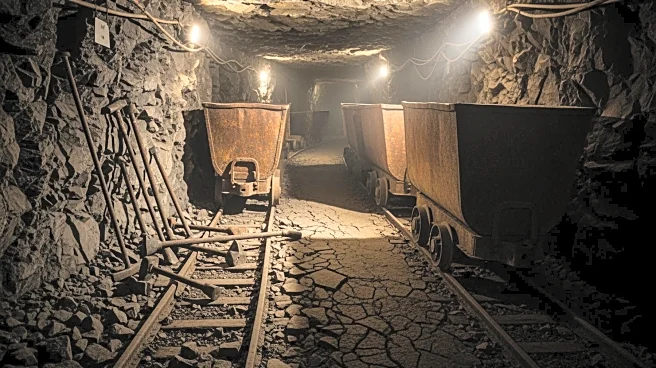What's Happening?
China has announced new export controls on rare-earth metals, a critical component in manufacturing semiconductors and weapons systems, in response to President Trump's tariff threats. This move comes
as tensions between the U.S. and China escalate, with President Trump threatening to impose a 100% tariff on Chinese imports by November 1. The rare-earth metals, which China processes 90% of globally, are vital to American national security. Beijing's decision to restrict exports could impact foreign companies that rely on these materials, requiring them to seek approval from the Chinese government for exports. Additionally, China has imposed sanctions on U.S.-linked subsidiaries of Hanwha Ocean, a South Korean shipbuilder, further complicating U.S.-China trade relations.
Why It's Important?
The tightening of rare-earth export controls by China highlights the growing economic tensions between the U.S. and China. These metals are crucial for various industries, including technology and defense, and the restrictions could disrupt supply chains and increase costs for American companies. The sanctions on Hanwha Ocean's subsidiaries could hinder the expansion of the U.S. shipbuilding industry, a sector President Trump aims to grow. The potential imposition of a 100% tariff on Chinese imports could further strain trade relations, affecting global supply chains and economic stability. The situation underscores the competitive nature of global economic relations, with both countries leveraging their economic power to influence trade policies.
What's Next?
President Trump and Chinese leader Xi Jinping are scheduled to meet at the Asia-Pacific Economic Cooperation summit in South Korea at the end of the month. The meeting could either ease tensions or escalate the trade conflict further. U.S. Treasury Secretary Scott Bessent is set to meet his Chinese counterpart in Malaysia to address the situation. The outcome of these discussions could determine the future of U.S.-China trade relations, with potential impacts on global markets and industries reliant on rare-earth metals. The possibility of further retaliatory measures from China remains, as both countries navigate the complexities of their economic relationship.
Beyond the Headlines
China's strategic use of rare-earth export controls reflects a shift in its policy, demonstrating a willingness to leverage economic power to influence global trade dynamics. This approach could lead to long-term changes in how countries engage in trade negotiations, with economic might becoming a tool for political leverage. The situation also raises ethical questions about the use of critical resources as bargaining chips in international relations, potentially affecting global cooperation and integration.








